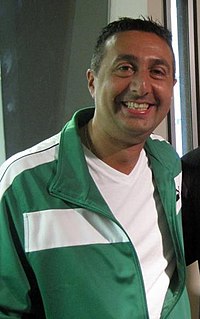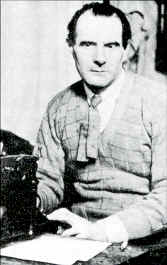A Quote by Roman Vishniac
The Jews of the shtetls that Tolstoy remembered were saints... the people I photographed were saints. So now, in 1983, I tell the world: When you learn about Goethe, don't forget to study the Holocaust, too.
Related Quotes
We always think of saints as these monks or nuns or popes or priests from centuries ago who were celibate or lived very quiet lives. Maybe we don't know a lot about a lot them but what I'm saying is the saints of the 21st century are gonna be regular people - people who've kissed other people. They're gonna be married people.
I think if I were reading to a grandchild, I might read Tolstoy's War and Peace. They would learn about Russia, they would learn about history, they would learn about human nature. They would learn about, "Can the individual make a difference or is it great forces?" Tolstoy is always battling with those large issues. Mostly, a whole world would come alive for them through that book.
If you were to do the world championship of victimhood in modern times, then the finals would probably be between Jews and Palestinians. I think the Jews win: we, Isralians, go from the Spanish Inquisition to pogroms to the fake Protocols of the Elders of Zion to World War II and the Holocaust - it's a horrible history. And if you look at the Palestinian world, victimized by every entity in the Middle East, they were massacred in every country. I think that, in Israel, the greatest fear that people have, and I have it, too, is this fear of genocide.
Having spent time around "sinners" and also around purported saints, I have a hunch why Jesus spent so much time with the former group: I think he preferred their company. Because the sinners were honest about themselves and had no pretense, Jesus could deal with them. In contrast, the saints put on airs, judged him, and sought to catch him in a moral trap. In the end it was the saints, not the sinners, who arrested Jesus.
One of the questions asked in that study was, How many Vietnamese casualties would you estimate that there were during the Vietnam war? The average response on the part of Americans today is about 100,000. The official figure is about two million. The actual figure is probably three to four million. The people who conducted the study raised an appropriate question: What would we think about German political culture if, when you asked people today how many Jews died in the Holocaust, they estimated about 300,000? What would that tell us about German political culture?
Although we tend to think about saints as holy and pious, and picture them with halos above their heads and ecstatic gazes, true saints are much more accessible. They are men and women like us, who live ordinary lives and struggle with ordinary problems. What makes them saints is their clear and unwavering focus on God and God's people.
Is America a land of God where saints abide for ever? Where golden fields spread fair and broad, where flows the crystal river? Certainly not flush with saints, and a good thing, too, for the saints sent buzzing into man's ken now are but poor-mouthed ecclesiastical film stars and clich?-shouting publicity agents. Their little knowledge bringing them nearer to their ignorance, ignorance bringing them nearer to death, but nearness to death no nearer to God.
Saints rarely have friends; they are usually hated and derided, for they love and love is always rejected by hard-hearted men....saints do not advertise themselves; good men do not seek out a name in the world....the saints did what they did almost in stealth, asking nothing except that men love God.
Whatever I had read as a child about the saints had thrilled me. I could see the nobility of giving one's life for the sick, the maimed, the leper. But there was another question in my mind. Why was so much done in remedying the evil instead of avoiding it in the first place? Where were the saints to try to change the social order, not just to minister to the slaves, but to do away with slavery?
The Saints in Heaven through the Holy Spirit behold the glory of God and the beauty of the Lord's Countenance. But in this same Holy Spirit they see our lives too, and our deeds. They know our sorrows and hear our burning prayers. When they were living on earth they learned of the love of God from the Holy Spirit; and he who knows love on earth takes it with him into eternal life in the kingdom of Heaven, where love grows and becomes perfect. And if love makes one unable to forget a brother here, how much more must the Saints remember and pray for us!




































